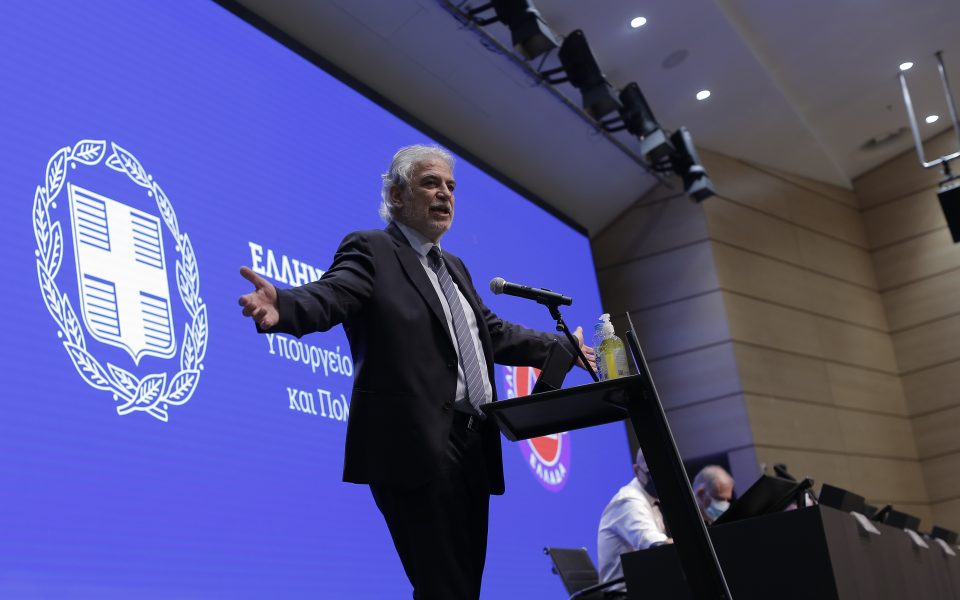Ex-EU crisis official steps into new role in Greece
Christos Stylianides well positioned to take on Greece’s climate change and civil defense portfolio

What does the appointment of Christos Styliandes as the head of Greece’s newly established Climate Crisis and Civil Protection Ministry indicate?
These are areas where the European Union’s aspirations for collective action have increased exponentially in the past few years, and even more so since the start of the pandemic. And the Cypriot official has a relationship with Europe that started long before he was appointed EU commissioner for humanitarian aid and crisis management by Jean-Claude Juncker in 2014.
Back in the 1980s, as a university student in Cyprus with an active interest in politics, Stylianides championed the island nation’s accession to what was then the European Economic Community, a position supported only by a minority at the time. In 1995, he co-founded the Movement for Political Modernization and Reform, whose chief aim was Cyprus’ accession to the European Union.
He served as government spokesman under Glafcos Clerides from 1998 to 1999 and worked closely with the Cypriot president and with his former fellow student activist Yiannos Kranidiotis on laying the groundwork for the historic European Council decision in Helsinki in December 1999 that paved the way for Cyprus’ accession, without a solution to the island’s division.
After a seven-year stint as MP for the center-right Democratic Rally party (DISY), he returned to the role of spokesman for the government of Nicos Anastasiades in 2013-14, at a time when his pro-European sympathies were sorely tested. He was there at the Eurogroup meeting where then Eurogroup president Jeroen Dijsselbloem and economic commissioner Olli Rehn presented Cyprus with the painful solution of a haircut on Cypriot bank deposits in order to avert bankruptcy.
That was the first time the EU’s new dogma on restructuring ailing banks with the aim of averting a hit on taxpayers was tested. The way it was implemented, however, and the differences in the approach toward indebted banks in other countries, sparked intense public reactions in Cyprus. Nevertheless, Stylianides stood firmly behind the belief that funding had to be sought within the European framework (instead of reaching out to Russia) and that Cyprus had to remain in the eurozone, at all cost.
After a short spell in the European Parliament, Stylianides was nominated by Anastasiades in 2014 as Cyprus’ representative on the Juncker Commission. Before even officially taking office, he had to deal with a health crisis which, though restricted to three countries in West Africa, had Europe on high alert because of the virus’ high mortality rate. “If we want to avert a pandemic, we need to deal with the virus where it began and not from our offices in Brussels,” Stylianides told the European Parliament in September 2014 during his hearing for the spot of commissioner.
In October, he was unanimously elected coordinator for the EU’s response to the Ebola outbreak. By the second week of November he was already out in the field in West Africa. He traveled to Liberia, Sierra Leone and Guinea. “No one dared travel there; not flight attendants nor doctors. Their isolation was incredible. Almost all flights had been banned,” he told Kathimerini in an interview in April 2020. His role was pivotal in ensuring that the three West African countries – which had kept the borders between them open but were not cooperating on dealing with the crisis – coordinated efforts to control the spread of the virus.
Stylianides’ greatest accomplishment as commissioner, however, was the creation of RescEU, a crisis response agency that significantly upgraded Europe’s collective ability to support member-states in the event of a natural or humanitarian disaster. The coronavirus pandemic – a disaster impacting all member-states at once and therefore making solidarity that much harder – has provided further proof of the need for joint reserves.
As commissioner, he was respected by his colleagues and admired for his willingness to help in any way he could in their initiatives, and was particularly liked by Juncker, who referred to him as “Commissioner Christos” after giving up on trying to pronounce his surname properly. Beyond his official duties and having developed a network of international contacts, particularly during the Ebola crisis (his American counterpart at the time is now the White House chief of staff), he has already been busy working quietly on issues of national importance for Cyprus and Greece.
With regard to Cyprus, he participated in contacts with Washington and Berlin on the road to the 2015-17 talks in the Swiss resort of Crans-Montana – and shared Juncker’s disappointment over the failure of those crucial negotiations. He was also gravely concerned about the impact on Cyprus’ reputation as a result of its granting “golden passports” to controversial international figures. His warnings were ignored by the Cypriot government; they are also believed to be part of the reason why he was not nominated for a second term as commissioner.
Stylianides’ new post in Athens presents different challenges. The combination of a bungling public administration and the hostile treatment he is bound to receive from a part of the governing party will make his work that much more complicated. But at a time when the climate crisis and the pandemic have so poignantly underscored the limits of state management regarding incidents on this scale, his European credentials are a crucial advantage, which may play a vital role in bolstering Greece against the dangers that lie ahead.





